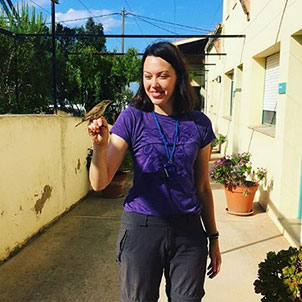Sarah Davies
Principal Research Officer, Wetland Bioscience

About me
I have loved nature since early childhood and always hoped to work with wildlife. After finishing a Zoology degree at the University of Nottingham, I volunteered on a toucan project in Costa Rica, where I caught the “research buzz”. This led me to an MSc in Conservation at UCL and a research project on a topic I am still passionate about - the wonderful world of pond restoration. The pursuit of conservation work has taken me to some fantastic places, from working on a nature reserve in Devon to rearing corncrakes with the Pensthorpe Conservation Trust. Before working for WWT, I undertook my PhD at Cardiff University on the effects of climate change on the diet of songbirds. I am fascinated by the ecology underpinning effective conservation, from disentangling species interactions, to evaluating how wetlands support landscape-scale ecological processes.
My role
My role is to gather data around the benefits of wetlands to biodiversity. I am particularly interested in demonstrating the value of aquatic insects (a type of aquatic subsidy) at ponds, as a food source for terrestrial wildlife. Over the past couple of years, I have piloted research into this topic, using a combination of methods such as stable isotope analysis and acoustic monitoring to study the emergence of aquatic insects at ponds and responses by pond-side insectivores. Currently, I am co-ordinating baseline ecological monitoring to aid the development of a new landscape recovery project, which aims to provide biodiversity benefits. I am also involved with exciting research using metabarcoding data to unravel the dietary preferences of the re-introduced crane population in Somerset.
Experience and interests
- Ecological surveys for aquatic invertebrates, bats and birds, including the use of eDNA methods and passive audio detection
- Dietary analysis and metabarcoding
- Statistical analysis in SPSS and R
- Science communication and writing, including training and outreach for citizen scientists
- Bird ringing and GPS tagging
Publications
Davies, S.R., Vaughan, I.P., Thomas, R.J., Drake, L.E., Marchbank, A. and Symondson, W.O.C. Seasonal and ontological variation in diet and age-related differences in prey choice, by an insectivorous songbird. Ecology and Evolution, 12, e9180.
Davies. S.R. 2020. Projecting the effects of climate change on prey selection and dietary competition in communities of European reedbed warblers. PhD thesis, Cardiff University.
Davies, S.R., Sayer, C.D., Greaves, H., Siriwardena, G.M. Siriwardena and Axmacher, J.C. A new role for pond management in farmland bird conservation. Agriculture, Ecosystems & Environment, 233, pp. 179-191.
Return to meet the team